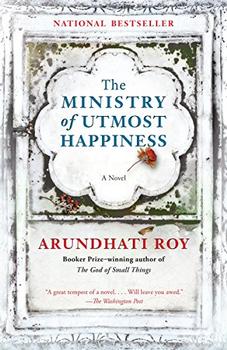Summary | Excerpt | Reading Guide | Reviews | Beyond the Book | Read-Alikes | Genres & Themes | Author Bio

This article relates to The Ministry of Utmost Happiness
 The Kashmir dispute between India and Pakistan occupies center stage in The Ministry of Utmost Happiness and is a conflict that traces its roots back to the Indo-Pak partition (for more about the partition, see Beyond the Book for An Unrestored Woman).
The Kashmir dispute between India and Pakistan occupies center stage in The Ministry of Utmost Happiness and is a conflict that traces its roots back to the Indo-Pak partition (for more about the partition, see Beyond the Book for An Unrestored Woman).
When the British left India in 1947, Kashmir was not an Indian state, but was instead one of hundreds of smaller independent princely states. each with their own rulers, who swore loyalty to the British empire. As the British Raj withdrew, these princely states had to make the complicated decision as to whether to become a part of either India or Pakistan, or become independent countries. Most that were within contemporary India's borders chose to become a sovereign part of the country.
Kashmir, in India's Northwest, proved to be a particular dilemma. Before we go ahead, a quick geography lesson: Kashmir as we refer to it today is really the state of Jammu and Kashmir. While most of Kashmir has a sizeable Hindu population, Jammu, which includes Ladakh, also has a large proportion of Buddhists. Most people, when they refer to Kashmir, are talking about the "valley" where Muslims form the majority. Srinagar, the capital, is in the valley.
At the time of Partition, Kashmir was ruled by a Hindu king, Maharaja Hari Singh. Kashmir was a majority Muslim state, which would have made integration with Pakistan (a largely Muslim nation), a logical conclusion, but the king wasn't so sure. Worried about all the waffling, Pakistan decided to play it safe and sent in Muslim tribesmen to cause trouble. As Srinagar was under crisis mode, Pandit Jawaharlal Nehru, India's newly created Prime Minister, sent his own emissary to seal the deal with the king. The move worked and the Raja signed an Instrument of Ascension with India.
Pakistan — and Kashmir's Muslim majority which mostly wanted to remain independent — was furious and India and Pakistan fought the first of many wars over Kashmir. Nehru took the case to the UN, which ruled that Pakistan had to withdraw forces, after which India would remove hers, and a free and fair "plebiscite" would determine the fate of Kashmir. Pakistan never complied and, therefore, neither did India. A ceasefire was enforced in 1948 along with a Line of Control (LOC) that grants the majority of Kashmir to India.
Skirmishes and more large-scale fighting have flared up ever since, even as Kashmir was officially included in the Indian Union in the '50s. India's army controls most of the valley with an iron grip. The people of Kashmir themselves have mostly demanded independence from the two countries, their cries drowned out as the subcontinent's superpowers continue to duke it out over God's own country nestled in the foothills of the Himalayas.
Filed under Society and Politics
![]() This "beyond the book article" relates to The Ministry of Utmost Happiness. It originally ran in July 2017 and has been updated for the
May 2018 paperback edition.
Go to magazine.
This "beyond the book article" relates to The Ministry of Utmost Happiness. It originally ran in July 2017 and has been updated for the
May 2018 paperback edition.
Go to magazine.
Your guide toexceptional books
BookBrowse seeks out and recommends the best in contemporary fiction and nonfiction—books that not only engage and entertain but also deepen our understanding of ourselves and the world around us.